Running Polygon zkEVM RPC nodes is easy with Moralis—the industry’s #1 node provider. Our intuitive user interface allows you to set up a Polygon zkEVM node with just a few clicks. If you’re eager to get started, here’s a quick three-step breakdown of the full process:
Step 1: Sign up for free with Moralis.
Step 2: Log in to the admin panel, go to the “Nodes” tab, click the “+ Create Node” button, and configure your node:
Step 3: Copy and integrate one of your RPC node URLs into your Polygon zkEVM project:
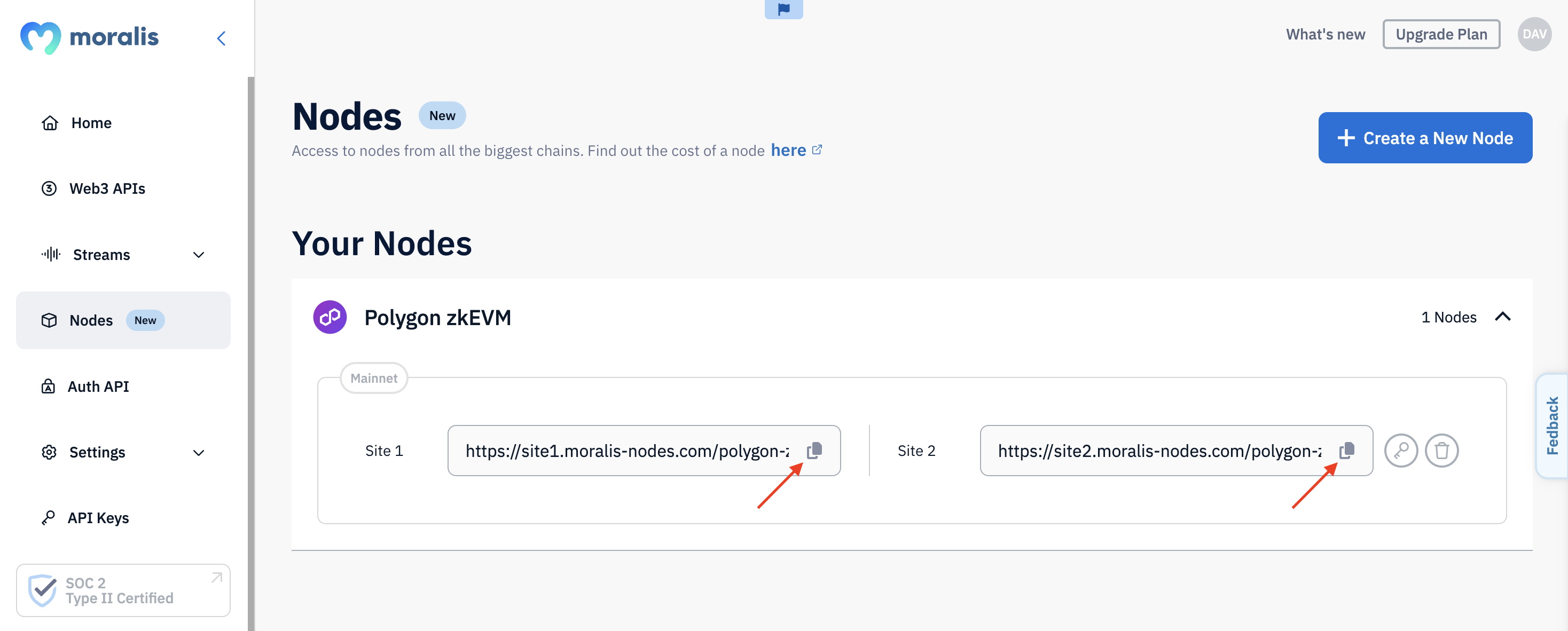
That’s it! Running Polygon zkEVM nodes doesn’t have to be more challenging than this when working with Moralis. If you’re looking for a more in-depth tutorial, join us as we walk you through the entire process from start to finish in further detail.
Ready to set up your own Polygon zkEVM node? Don’t forget to sign up with Moralis. You can set up an account for free and gain immediate access to our top-tier node service!
Overview
Setting up Polygon zkEVM RPC nodes from scratch can be a daunting task. It requires a complex infrastructure that is both resource-intensive and time-consuming to establish. Additionally, since nodes are chain-specific, you need to set up the required infrastructure for each network you intend to interact with. And for developers building cross-chain decentralized applications (dapps), this can quickly become costly. Fortunately, you can avoid these challenges with a node provider like Moralis!

At Moralis, we handle all the underlying complexities of running blockchain nodes for you. This allows you to set up your own Polygon zkEVM node with just a few clicks, making the entire process a breeze. To learn more about how this works, join us in this tutorial. Let’s get started!
What is Polygon zkEVM?
Polygon zkEVM, launched in 2023, is an innovative and decentralized Ethereum layer-2 (L2) scaling solution. By integrating two powerful technologies—zero-knowledge proofs and the Ethereum Virtual Machine—Polygon zkEVM offers a highly scalable, secure, and user-friendly blockchain platform!

Polygon zkEVM uses cryptographic zero-knowledge proofs to bundle multiple transactions off-chain, later verifying them in a single batch on the Ethereum mainnet. This approach significantly reduces the load on Ethereum, resulting in higher throughput and much lower transaction costs.
The network is fully EVM-equivalent, making it easy for developers to migrate existing Ethereum dapps and smart contracts to Polygon zkEVM. Additionally, developers can leverage a wide range of existing Ethereum development tools, such as wallets like MetaMask and programming languages like Solidity, to build on the network. This compatibility improves the developer experience and simplifies the creation of Polygon zkEVM-compatible projects.
With this overview of Polygon zkEVM, let’s now explore the advantages of building on this innovative network!
Benefits of Building on Polygon zkEVM
Building dapps on Polygon zkEVM offers several significant advantages. Here are four key benefits:
Low Gas Fees: Polygon zkEVM’s off-chain transaction processing and zero-knowledge proofs result in minimal transaction fees, providing a cost-effective solution for both developers and users.
High Throughput: Through batching, multiple transactions can be verified simultaneously, alleviating network congestion and substantially increasing throughput.
EVM Equivalence: Developers can easily transition to Polygon zkEVM, utilizing their existing knowledge, skills, and tools from Ethereum.
Enhanced Security: Zero-knowledge proofs ensure transaction integrity, bolstering the security of the Polygon zkEVM platform.
What are Polygon zkEVM Nodes?
Put simply, Polygon zkEVM nodes are servers, computers, and other devices participating in the network by performing many critical tasks. Some prominent examples include processing transaction batches, broadcasting data, and storing information. These nodes are the backbone of Polygon zkEVM, and by working in unison, they ensure the blockchain’s security and efficient operation!

So, how are Polygon zkEVM RPC nodes utilized?
Transaction Validation: Polygon zkEVM nodes validate transactions and propagate new blocks to the chain. These functions are crucial for maintaining the security of the network.
Data Storage: Certain Polygon zkEVM nodes store a complete record of all transactions and smart contract states. This comprehensive storage enables anyone to verify transactions, upholding the network’s integrity.
Dapp Development: Polygon zkEVM nodes allow developers to read and write blockchain data, making them indispensable for Web3 development.
With this understanding of what Polygon zkEVM RPC nodes are, we’ll now show you how to set one up seamlessly using Moralis!
Introducing Moralis – The Industry’s #1 Node Provider
Moralis is the industry’s premier infrastructure provider, offering nodes for 20+ blockchain networks. At Moralis, we take care of all the underlying complexities of running nodes, allowing you to effortlessly set up a zkEVM node in a heartbeat using our intuitive point-and-click interface!
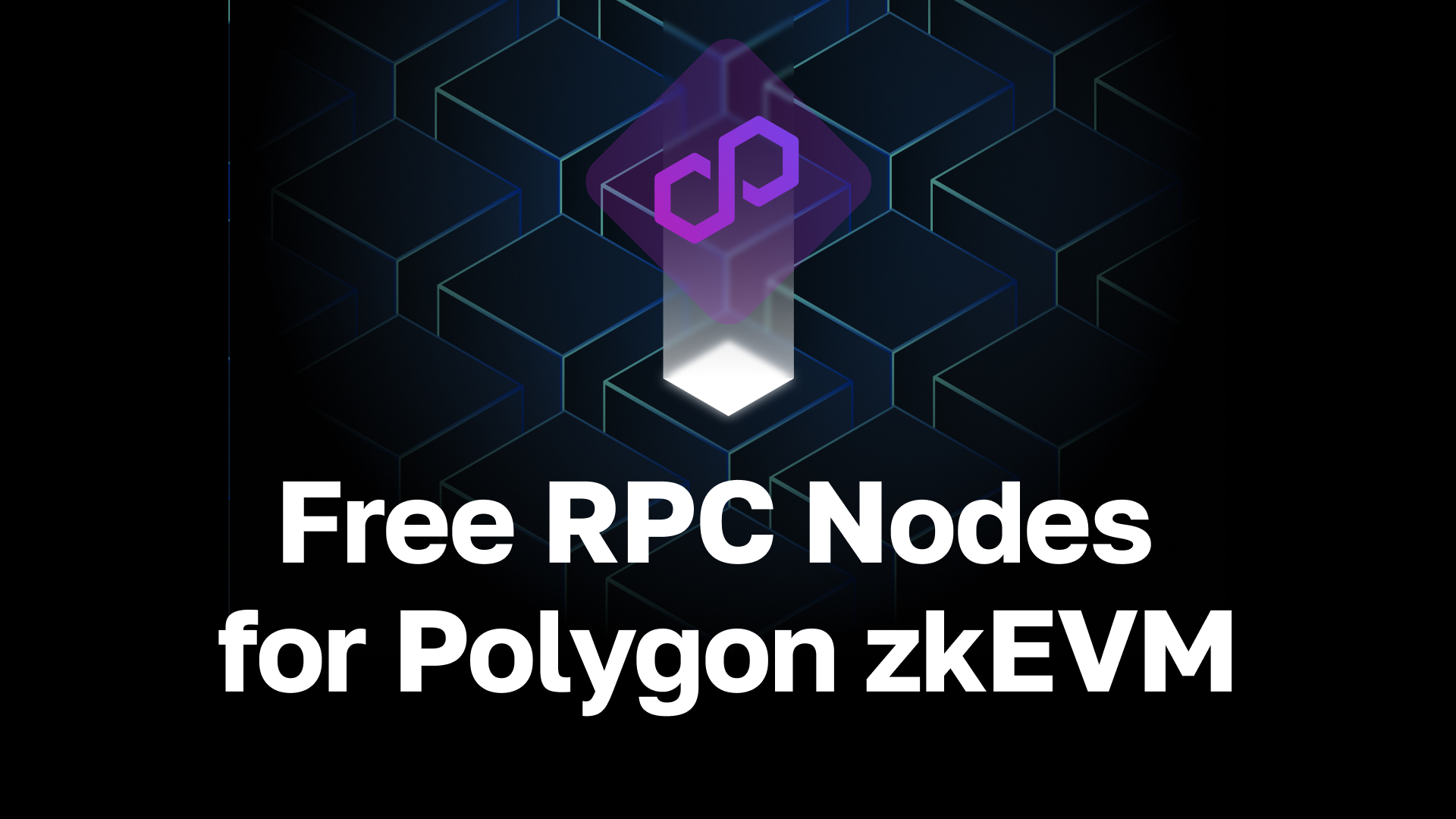
But why choose Moralis as your node provider?
Reliability: Moralis infrastructure and tools are built to the highest reliability standards, ensuring 99.9% uptime for all our nodes.
Speed: Our top-tier nodes set the industry benchmark for response times, starting at just 70 ms. Consequently, with Moralis, you receive on-chain data instantly without any delays.
Security: Don’t risk your company’s data. Choose Moralis—the only SOC 2 Type 2 certified infrastructure provider—and experience the gold standard for enterprise-grade data security.
Now that you have an overview of our node service, let’s take a closer look at how it works in practice!
3-Step Tutorial: How to Set Up a Polygon zkEVM Node
In order to run a Polygon zkEVM node, you’ll need a Moralis account. As such, before you proceed, make sure to register an account by clicking ”Start for Free” at the top right:
From here, follow the three steps below to set up your Polygon zkEVM node:
Step 1: Log in, go to the ”Nodes” tab, and hit ”+ Create Node”:
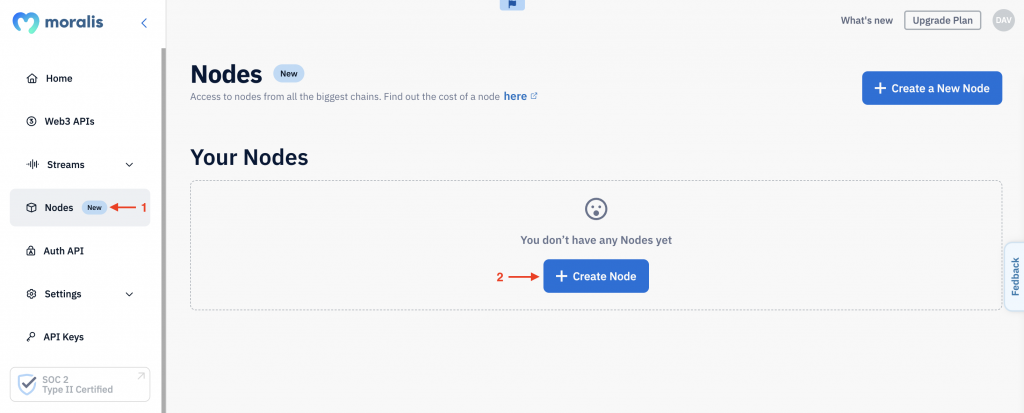
Step 2: Select ”Polygon zkEVM” followed by ”Mainnet”:
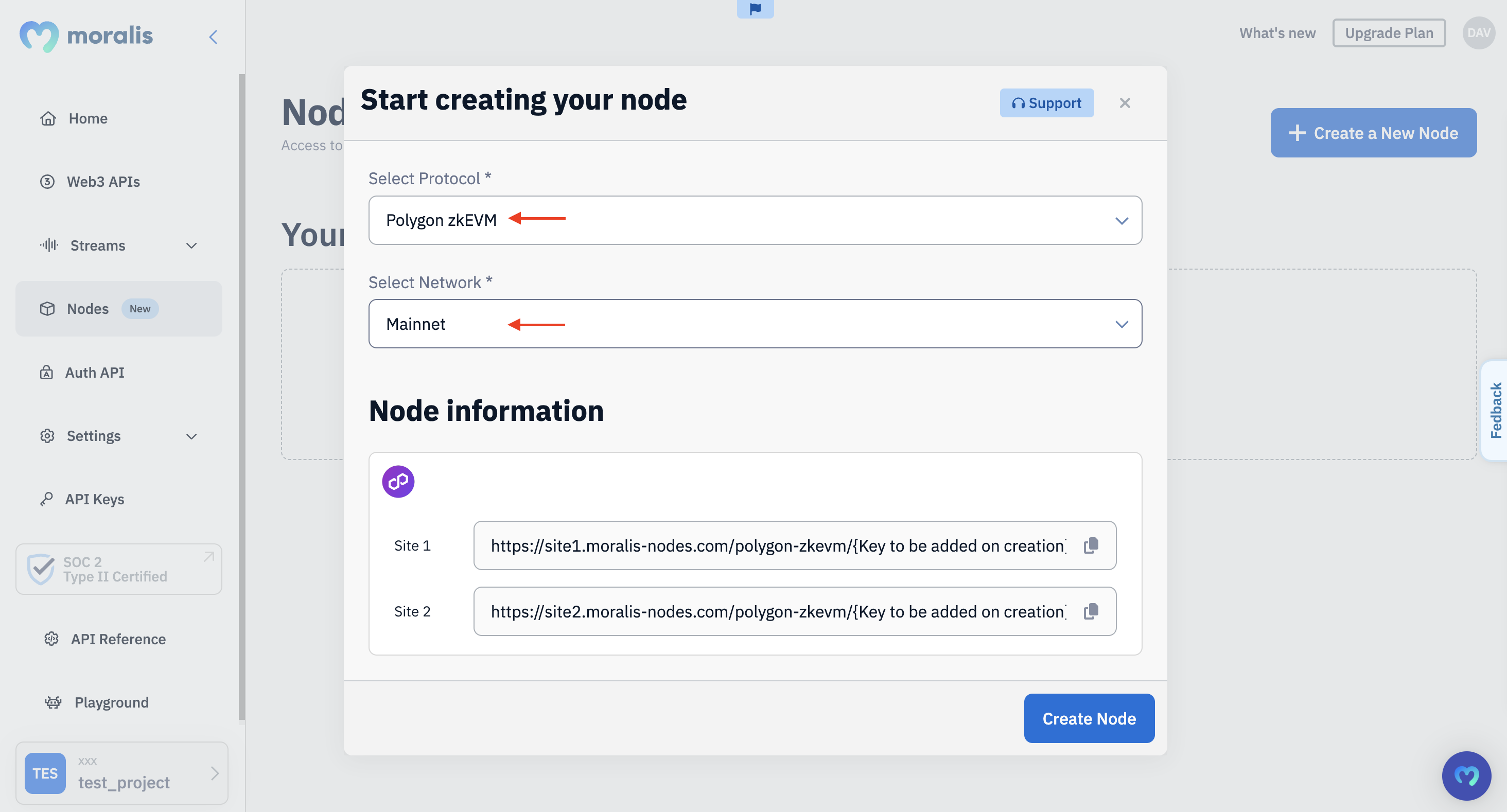
Step 3: Hit the ”Create Node” button:
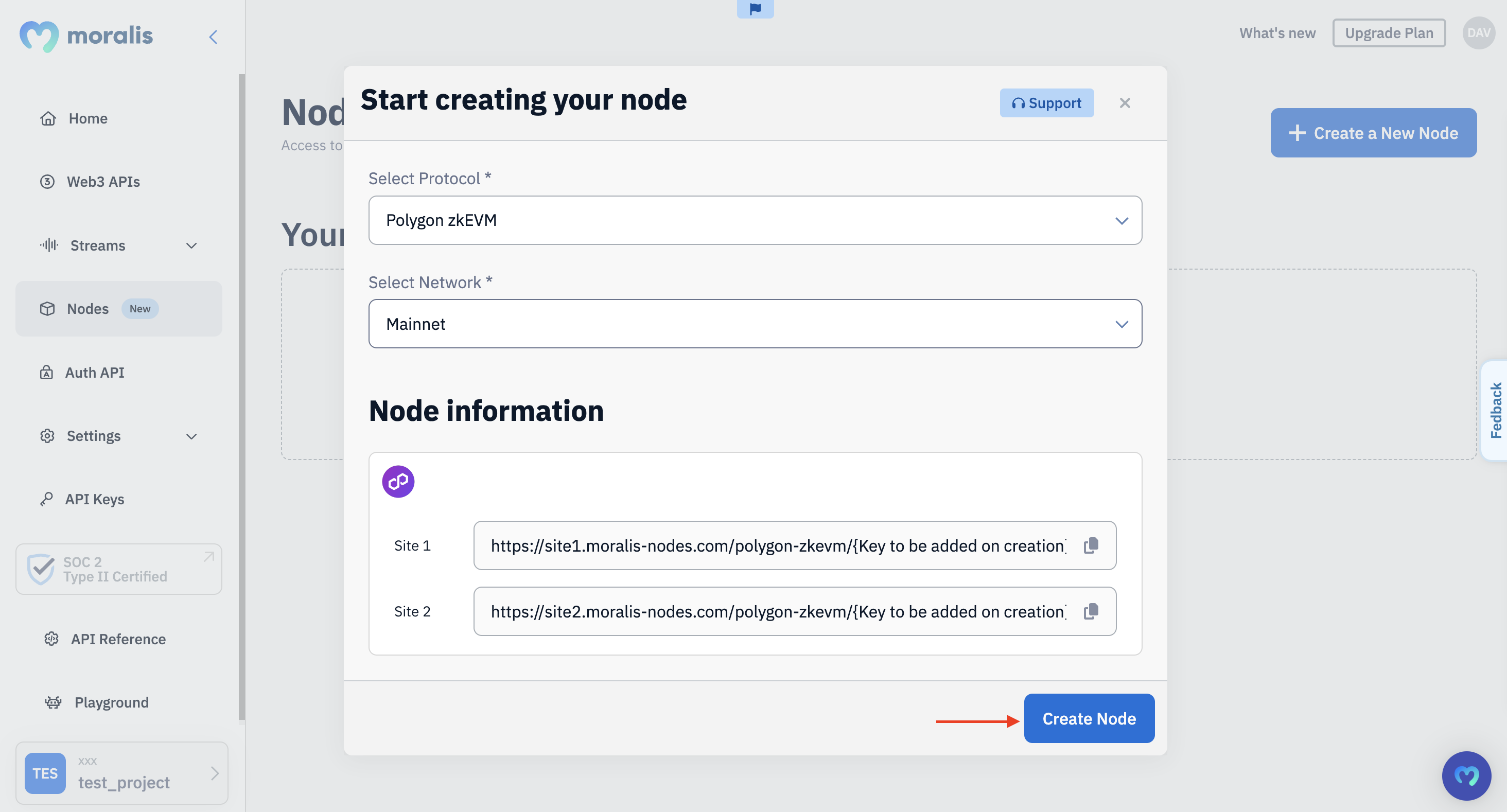
That’s it! With Moralis, it’s easy to set up Polygon zkEVM nodes!
From here, you can simply copy and integrate one of the node URLs into your code to interact with Polygon zkEVM:
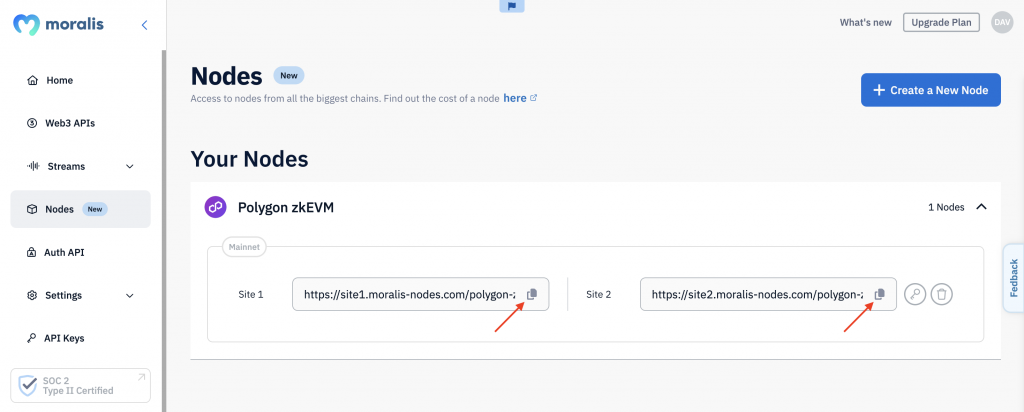
How to Call Polygon zkEVM RPC Nodes
Now that you know how to set up a Polygon zkEVM RPC node with Moralis, we’ll also show you how to interact with it using the Ethers.js library. More specifically, we’ll demonstrate how to fetch the native balance of any wallet!
However, before you get started with the tutorial, you need to take care of the following prerequisites:
Once these prerequisites are met, we can proceed with the tutorial:
Step 1: Set Up a New Project: Open your preferred IDE, create a folder, and initialize a new project with the terminal command below:
npm init
You should then add “type”: “module” to your ”package.json” file:
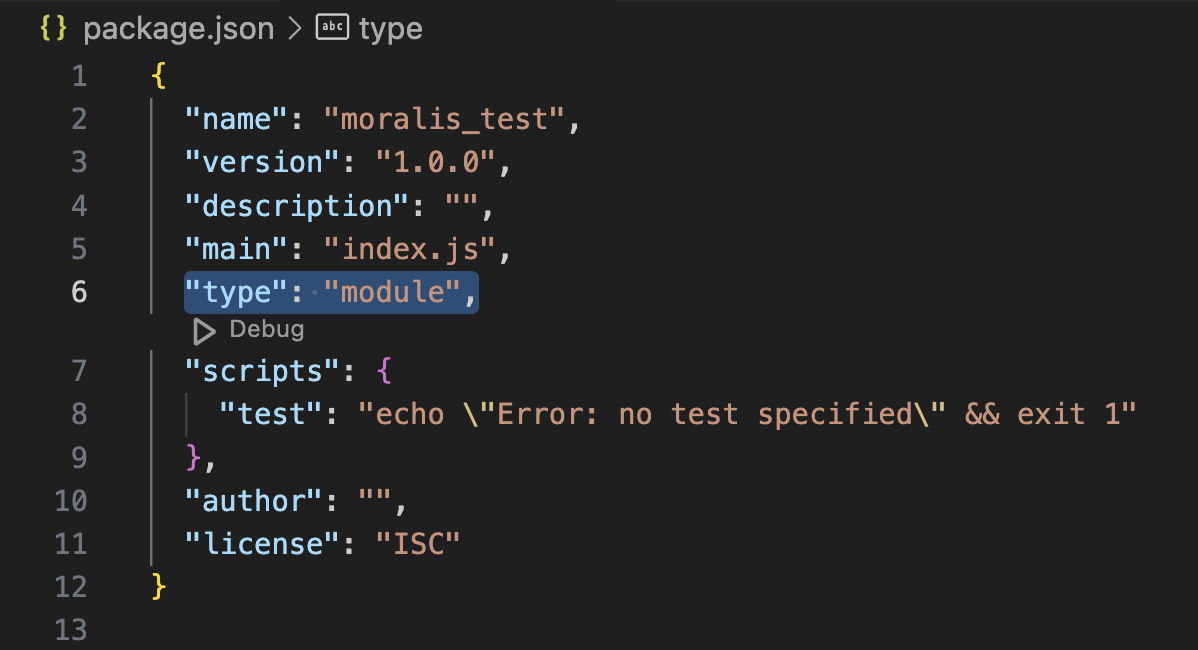
Step 2: Install Ethers.js: Open a new terminal and run the command to install Ethers.js:
npm install ethers
Step 3: Write Your Script: Create a new ”index.js” file and add the code below:
import { ethers } from “ethers”;
const provider = new ethers.providers.JsonRpcProvider(“YOUR_NODE_URL”);
const address = “0x4943b0C9959dcf58871A799dfB71becE0D97c9f4”;
const balance = await provider.getBalance(address);
console.log(“Balance: “, ethers.utils.formatEther(balance));
Step 4: Code Configurations: Replace YOUR_NODE_URL with one of your Polygon zkEVM node URLs and configure the address parameter to fit your query:

Step 5: Run the Code: Execute the script by running this command in the terminal:
node index.js
When you run the code, you’ll get the native balance of the specified wallet. It will look something like this:
Balance: 0.9952705014199
Congratulations! You now know how to make RPC calls to your Polygon zkEVM RPC nodes!
If you’re looking for a more detailed breakdown of the steps above, featuring more examples of the types of data you can fetch using your node, please watch the Moralis YouTube video below:
Limitations of Nodes
While nodes allow you to both read and write on-chain data, they aren’t always the best option for querying the blockchain. To explain why, let’s delve into three critical drawbacks of using nodes for this purpose:
Chain Specificity: Nodes are tied to specific blockchain networks. This means that if you want to build cross-chain compatible dapps, you must run a node for each chain you interact with.
Query Complexity: Nodes can’t handle complex queries. For instance, you cannot directly ask a node, “What tokens is wallet X holding?” Instead, you must make multiple requests and manually compile the data, which can be cumbersome and inefficient.
Raw Data: Data retrieved from nodes is raw and unprocessed. To make it useful, you must decode, interpret, and format it yourself, which is both time-consuming and tedious.
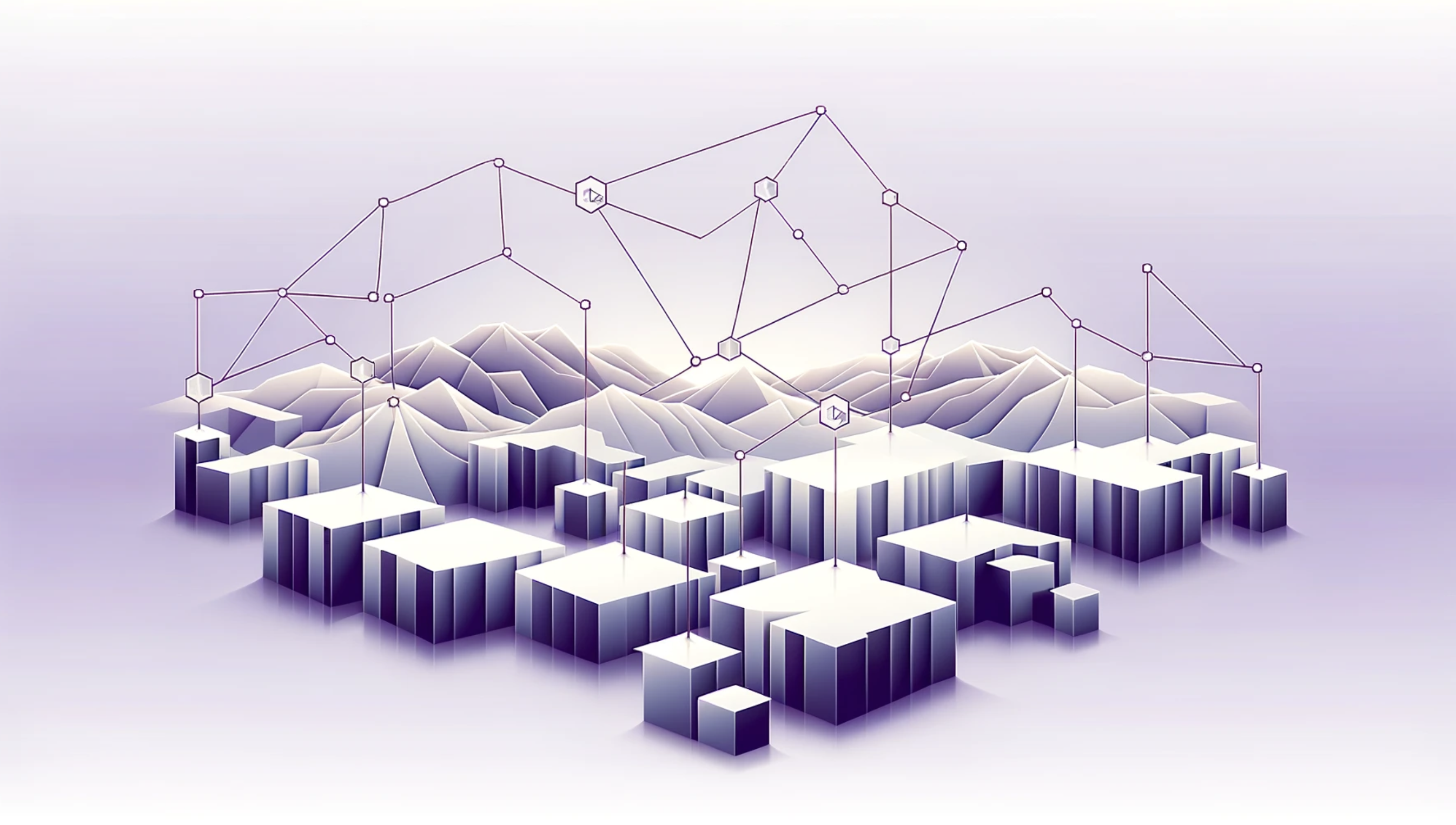
So, how can we avoid the challenges above and more efficiently query on-chain data?
Well, the most straightforward alternative is to use a premier Web3 API provider like Moralis. With our APIs, you can now query complex, decoded on-chain data from 30+ blockchain networks with single lines of code. To learn more about this, join us below as we dive deeper into Moralis!
Beyond zkEVM RPC Nodes – Exploring Moralis’ Web3 APIs
Moralis is the industry’s premier Web3 API provider, and in our toolkit, you’ll find over ten specialized interfaces for various use cases. Some prominent examples include the Wallet API, Token API, and Streams API. As such, it doesn’t matter if you’re building a cryptocurrency wallet, token explorer, or any other Web3 platform; we have the tools for you!

But what makes our APIs stand out against the competition?
Comprehensive: All our APIs are designed with the outcome in mind. As such, when working with Moralis, you get more data with fewer API calls, allowing you to build dapps faster and more efficiently.
Cross-Chain: Our APIs are truly cross-chain, supporting all major chains, including Ethereum, Polygon, BSC, and many more. So, when leveraging Moralis, you can seamlessly build cross-chain dapps without breaking a sweat.
Secure: Experience the gold standard for enterprise-grade data security with Moralis—the only SOC 2 Type 2 certified Web3 infrastructure provider.
If you’d like to explore our premier interfaces, please visit the Web3 API page!
Moralis Success Stories
Now that you’re aware of the benefits of using Moralis’ Web3 APIs, let’s explore how our premier tools have helped customers achieve remarkable success. Here are three notable customer success stories:
Changex: Changex is a personal finance management platform that allows users to seamlessly manage both their crypto and fiat assets in one place. By leveraging Moralis’ Web3 API suite, Changex was able to go to market in less than a month:
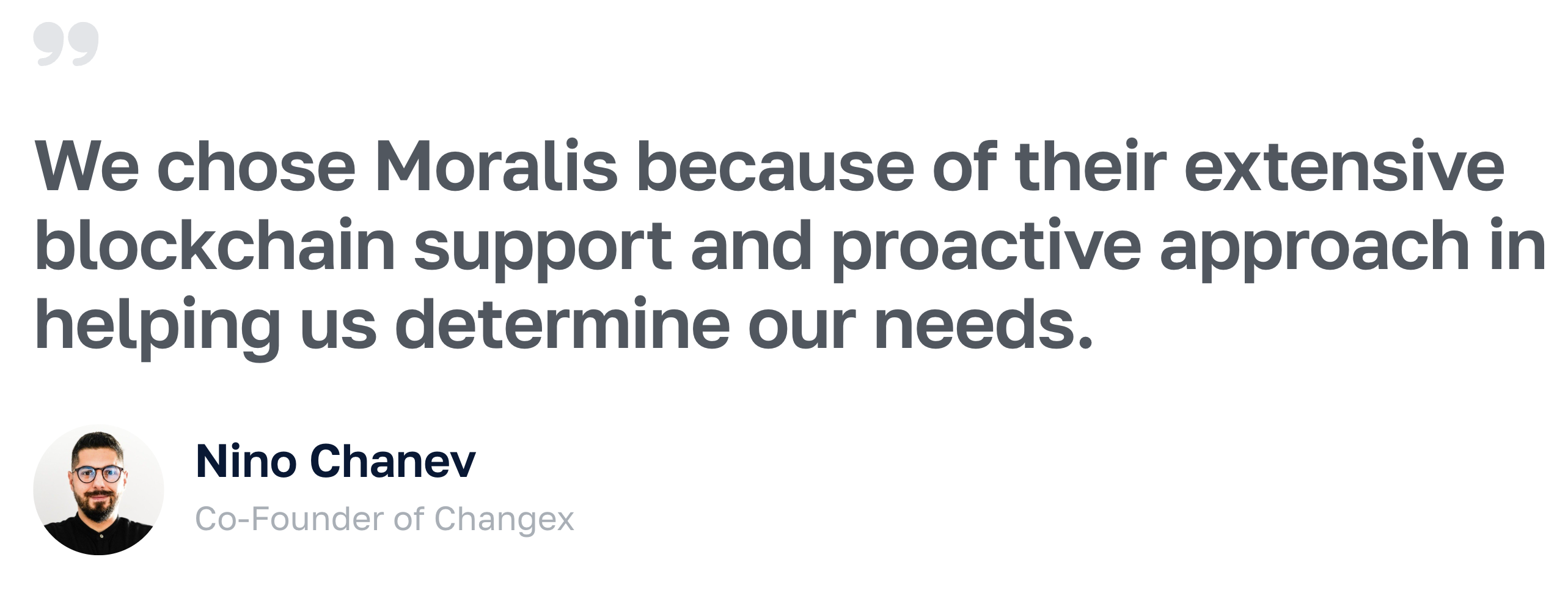
Kriptomat: Kriptomat, an Estonia-based fintech company, aims to bridge decentralized and centralized finance through its cryptocurrency exchange. With Moralis’ support, Kriptomat was able to reduce costs by an impressive 94%:
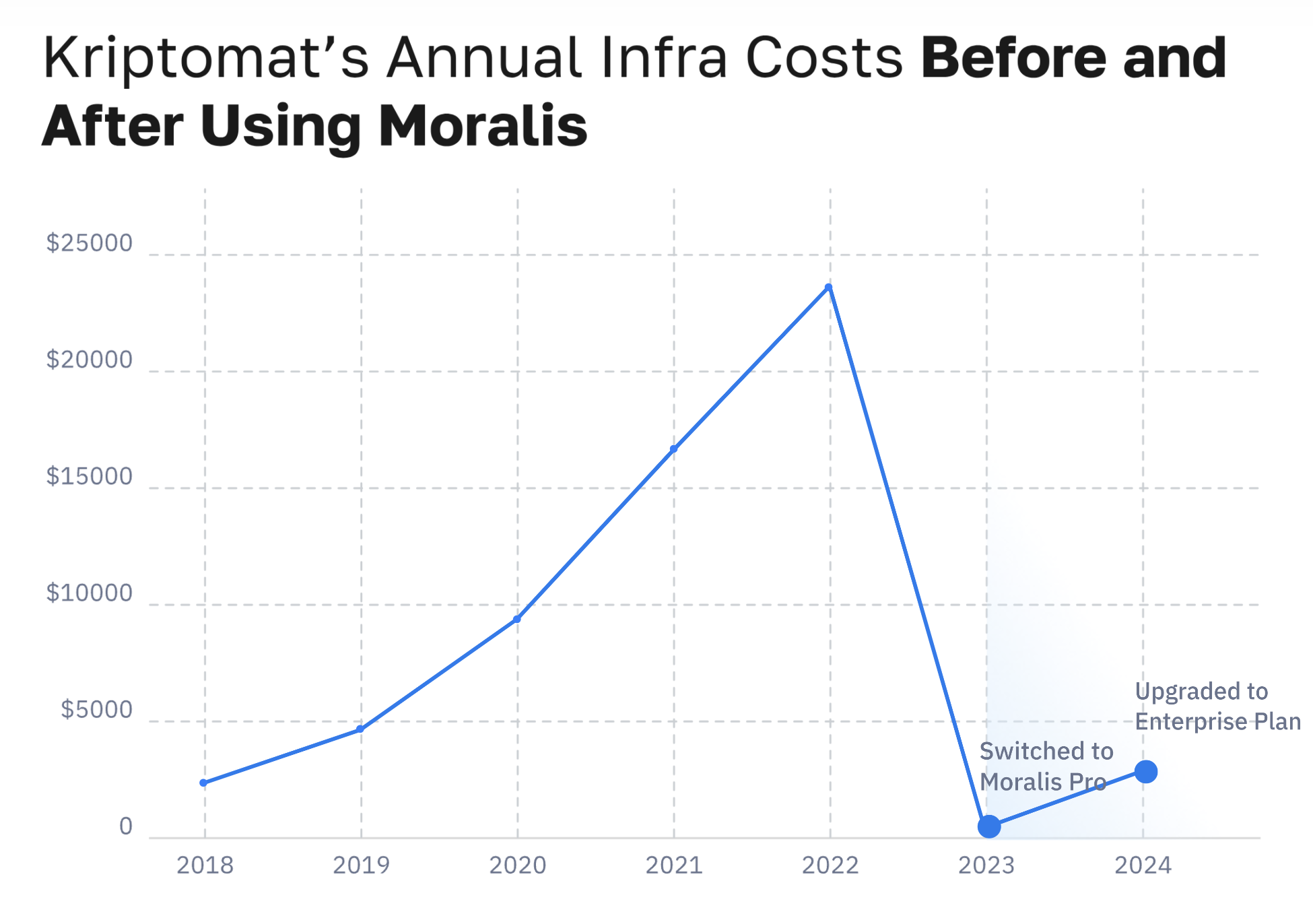
MetaMask: As one of the largest wallet providers in Web3, MetaMask boasts over 30 million monthly active users. MetaMask utilizes Moralis’ NFT API to effortlessly fetch NFT data for their portfolio solution, allowing them to focus more on building exceptional user experiences:
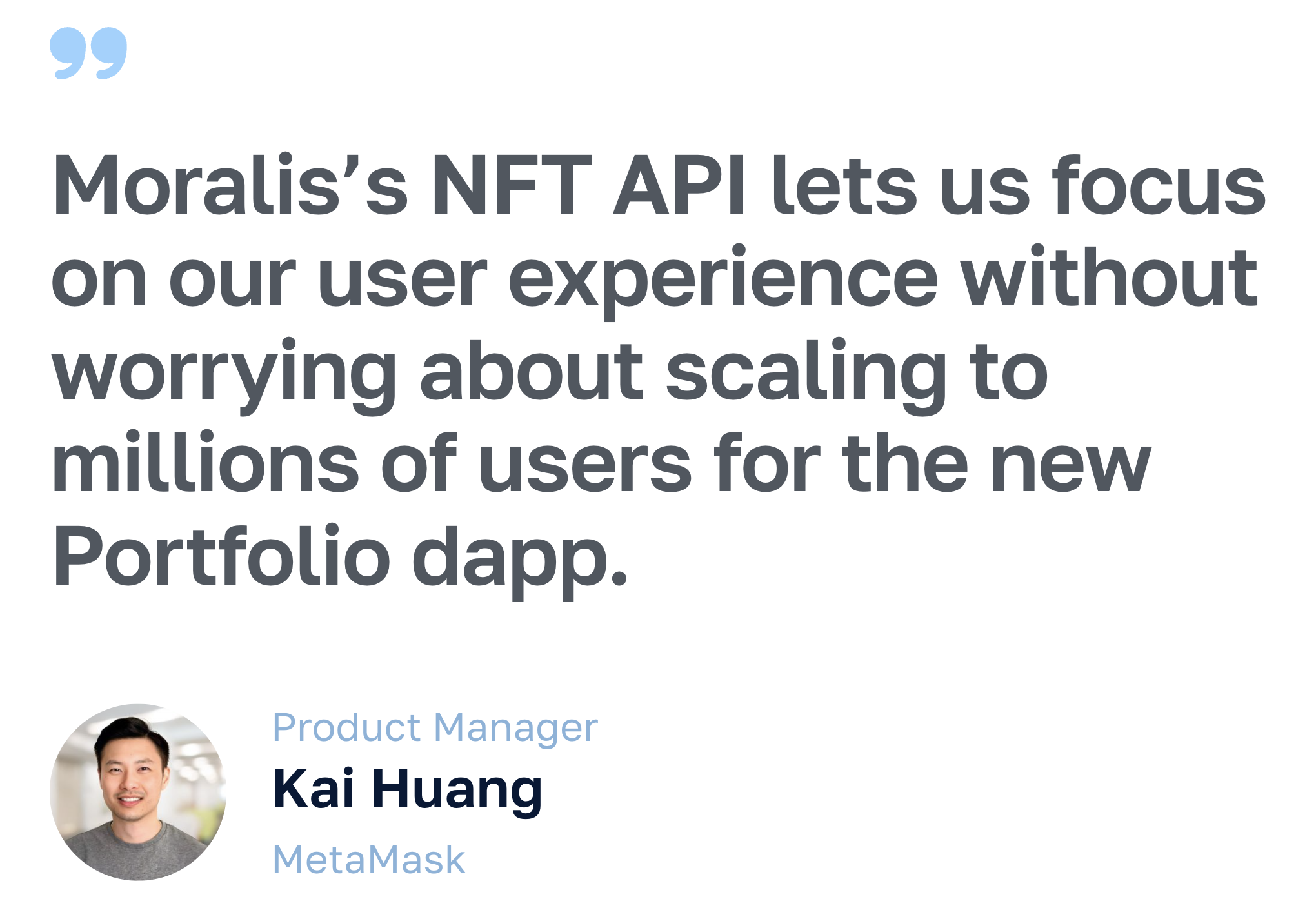
Summary: How to Run Polygon zkEVM RPC Nodes with Moralis
In order to run Polygon zkEVM RPC nodes from scratch, you generally need to set up a complex underlying infrastructure, which is both expensive and tedious to establish. What’s more, if you’re building cross-chain dapps, you’ll need to go through this bothersome process for each chain you’re planning to interact with. Fortunately, you can now avoid the associated complexities with a node provider like Moralis!
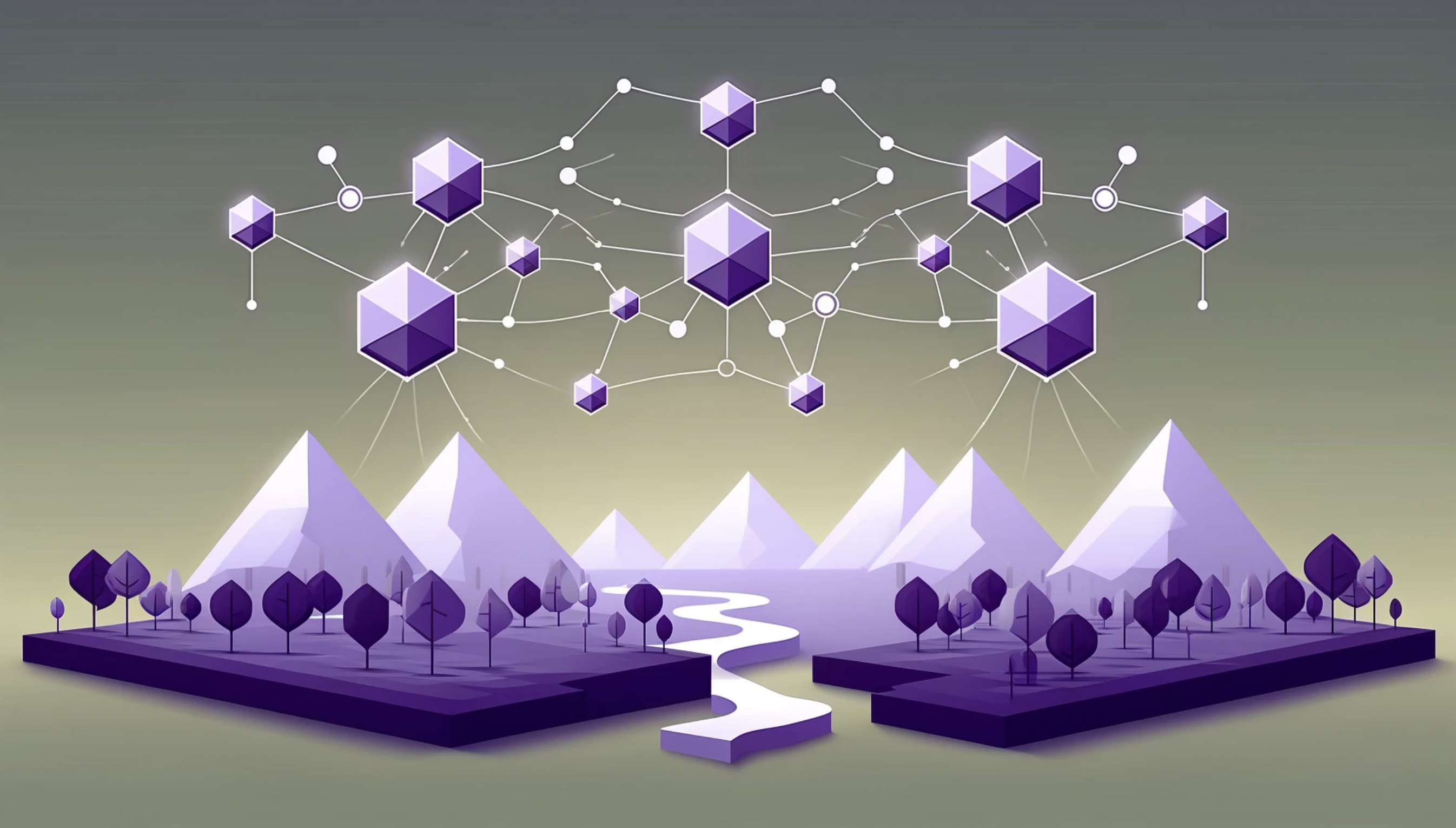
With Moralis’ intuitive UI, you can now seamlessly set up a node for all major chains—including Polygon zkEVM—at the click of a button. But why leverage our node service in particular?
Speed: Moralis’ nodes set the benchmark for response times, getting as low as 70 ms. This means you’ll receive the data you need without any delays.
Reliability: Our node infrastructure is built to the highest reliability standards, ensuring 99.9% uptime.
Security: Choose Moralis and build your Polygon zkEVM dapps with the only SOC 2 Type 2 certified Web3 node provider.
If you liked this Polygon zkEVM RPC nodes tutorial, consider reading more guides here on the blog. For instance, check out our latest article on ZetaChain RPC nodes, learn how to set up Base nodes, or explore the intricacies of Ethereum nodes.
Also, if you wish to set up your own Polygon zkEVM node, don’t forget to sign up with Moralis. You can register your account free of charge, and you’ll gain immediate access to our premier APIs and node service!





















